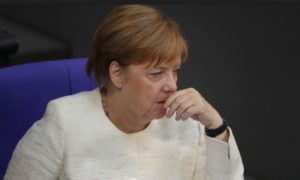Europe’s migration crisis rumbles on
 European Union leaders say they have secured a new deal on the migration crisis that has beset the continent since 2016.
European Union leaders say they have secured a new deal on the migration crisis that has beset the continent since 2016.
There is pre-ambulatory text but not really any clear agreement on what European nations will do collectively to cope with the continued, though smaller, influx of migrants.
The plan leaves important details blank – most importantly a common EU policy on refugees.
The EU has been struggling to deal with an inflow of migrants from across the Mediterranean Sea.
Southern European countries, especially Italy, Greece and Malta, have borne the brunt of rescuing people at sea and processing refugees.
The job falls to them because of a controversial rule — the so-called Dublin regulation — which says that asylum applications should generally be handled by the country of entry.
The number of new arrivals has fallen significantly since the peak in October 2015, but dealing with the consequences of earlier migration is still difficult.
Resentment of migrants across Europe is growing.
It was a key factor in delivering government to right-wing parties in Italy, Austria and Hungary.
Germany’s Chancellor Angela Merkel has come under pressure from the Christian Social Union, a junior coalition partner, to restrict the movements of migrants within the EU.
The new agreement includes a plan to set up “controlled centres” across the EU to process migrants, but only on a voluntary basis.
It also talks of exploring whether centres could be set up outside the EU, most likely in north and west Africa.
But it did nothing to revise the Dublin agreement. Leaders agreed that any changes to that accord would require bread consensus, effectively giving a veto to hardline governments.
To add to the confusion, Austria has suggested it would restrict movement across its borders if Germany imposed its own new planned entry restrictions on refugees agreed to by Ms Merkel as part of a compromise with her coalition partners in recent days.
The policy, which would see migrants entering Germany held in centres and potentially sent back to other EU countries if they had already registered somewhere else, is part of a deal between Ms Merkel and her fractious right-ring interior minister Horst Seehofer.
Austria obviously fears measures to turn back migrants could make it the final destination for more people.
Ms Merkel has already said that she fears that Germany toughening its stance could cause a wave of border closures across Europe and threaten the integrity of the EU.
She has paid a high price to keep her government intact.
The CSU’s war of attrition against the Chancellor, driven partly by personal animus and partly by panic about the rise of the anti-immigrant Alternative for Germany party ahead of state elections in Bavaria in October, is surely not over.
Mr Seehofer, having secured these concessions, will come under pressure from his party to demand more.
These will inevitably be on immigration and on reforms to the euro zone.
The conflict between Merkel’s Social Democrats and the CSU has been postponed but not dowsed.
And Europe, now searching in earnest for solutions to the migration crisis, hasn’t found one in the new agreement
Laurie Nowell
AMES Australia Senior Journalist












